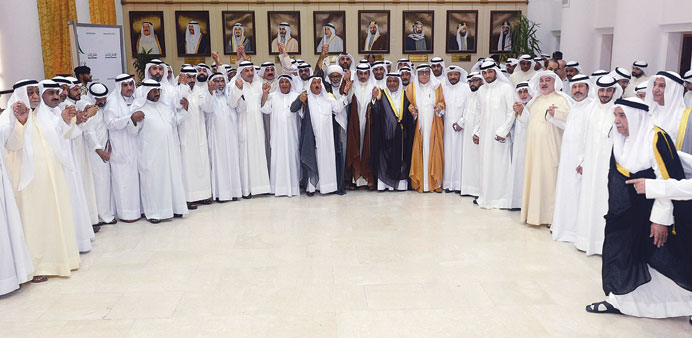Kuwaiti parliament speaker Marzouq al-Ghanim (centre) poses for a group photo with men who lost family members in the suicide attack at a mosque last week, at the national assembly in Kuwait City yesterday.
AFP/Kuwait City
Kuwait’s parliament, reacting to a suicide bombing last week that killed 26 people, adopted a law yesterday requiring mandatory DNA testing on all the country’s citizens and foreign residents.
The legislation, requested by the government to help security agencies make quicker arrests in criminal cases, calls on the interior ministry to establish a database on all 1.3mn citizens and 2.9mn foreign residents.
Under the law, people who refuse to give samples for the test face one year in jail and a fine of up to $33,000. Those who provide fake samples can be jailed for seven years.
Parliament also approved a $400mn emergency funding for spending required by the interior ministry.
“We have approved the DNA testing law and approved the additional funding. We are prepared to approve anything needed to boost security measures in the country,” independent MP Jamal al-Omar said.
A suicide bomber blew himself up during Friday prayers last week at a Shia mosque in the capital, also wounding 227 people, in an attack claimed by the Islamic State group.
IS’s Saudi affiliate, the Najd Province, claimed the bombing and identified the assailant as Abu Suleiman al-Muwahhid. Kuwaiti authorities said his real name was Fahd Suleiman Abdulmohsen al-Qabaa, saying he was a Saudi born in 1992.
Interior Minister Sheikh Mohamed Khaled al-Sabah told parliament on Tuesday security agencies had busted the “terror cell” behind the bombing.
“We are in a state of war. Yes, we have busted this terror cell but there are other cells we are going to strike,” Sheikh Mohamed said.
He said the emirate has revised “all security measures, especially around mosques and all places of worship”.
Of an unspecified number of suspects arrested, five have been referred to the public prosecution service. They include the driver who took the bomber to the mosque and the owner of the car.
Justice and Islamic Affairs Minister Yacoub al-Sane told parliament the supreme judicial council has decided to create a special court to try the case.
IS considers Shias to be heretics.
In May, the group claimed responsibility for two similar bloody attacks against Shia mosques in Saudi Arabia and has carried out several deadly anti-Shia attacks in Yemen.
In Bahrain, the interior ministry was recruiting “security volunteers” to protect places of worship, the official BNA news agency reported.
So far, there have been no attacks on Shia mosques in the kingdom.
Two police officers held in crackdown: media
Kuwait has arrested two police officers in a security crackdown on Islamist militants launched after last week’s deadly bombing of a mosque claimed by Islamic State, newspapers reported yesterday.
The attack by a suicide bomber on Friday killed 26 people and injured more than 200, prompting the government to declare it was at war with Islamist militants and would strike at cells believed to be on its soil.
Security forces found weapons, ammunition, maps and slogans supporting IS in a raid on the home of a student and another suspect who said they had received the weapons from the officers, Al Rai daily quoted security sources saying.
About 90 people have been detained by authorities investigating the attack, Al Qabas newspaper said yesterday, up from 60 reported by media on the previous day.
Ten suspects, among them Saudis, Kuwaitis and stateless residents, had been referred to the public prosecution, it reported, a move that indicates a criminal case has been opened.
Among the 10 are five principal suspects accused of helping the suicide bomber, a Saudi, carry out the attack, it said.

